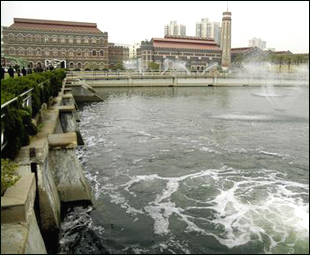Shanghai will source up to 60 percent of tap water from the Yangtze River in a bid to improve its quality up to the level of developed countries by 2020, said a local water authority. The city currently relies on the river for about 30 percent of its water.
Changing water sources, renovating piping and building new waterworks are among the measures the city is taking to improve the quality of its water, said Zhu Shiqing, deputy director of Shanghai's Water Affairs Bureau.
Zhu said more water from the Yangtze would offset the declining amount coming from the heavily polluted Huangpu River which is currently the main source of the city's drinking water.
"The Huangpu River accounts for about 70 percent of the city's water supply but its water quality is worse than that of the Yangtze," said Zhu. The local government is building several big reservoirs at an estuary of the Yangtze River, Zhu explained.
The Qingcaosha Reservoir, which lies west of Changxing Island at the mouth of the Yangtze River, will provide 7.2 million cubic meters of fresh water per day when completed in 2010. The project is expected to cost the local government 16 billion yuan (US$2.05 billion).
The Shanghai water authority would like the Yangtze to eventually account for 60 percent of the city's water supply. It currently provides 30 percent, said Chen Guoguang, vice-director of the Shanghai Water Supply and Water Quality Monitoring Centre.
Chen said work was also underway to change the city's water supply system. By 2010 four major waterworks in the city centre and a further eight in the suburbs would take over the work of the city's 160 existing small waterworks. They’ll be closed.
The low quality of the city's drinking water is the source of constant complaints by Shanghai residents. The biggest criticism is the strong chlorine taste of the water. Chen said the water authority put chlorine into processed tap water to kill germs and bacteria.
"The chlorine might have spoiled the taste but we must do that to ensure the quality," he said. "And the quality of Shanghai's tap water meets national health standards and is safe to drink."
(China Daily December 12, 2006)

